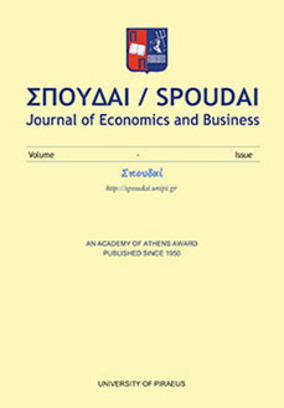A wage policy for external balance and employment in EMU environment : a theoretical approach
Part of : Σπουδαί : journal of economics and business ; Vol.61, No.3-4, 2011, pages 85-102
Issue:
Pages:
85-102
Author:
Abstract:
Wage developments and related policies that determine labor markets functioning and wage formation processes, are key factors with central importance in EMU. Flexibility in labor markets functioning and wage-setting aiming to nominal and real wage flexibility, has been the most important policy instrument remaining at national level for responsive national economies and adjustment to shocks. By this paper we analyze the preconditions and importance of a flexible functioning labor market framework, arising from the extended literature and related implemented policies. On the other side of the issue, we discuss the determinants of the conventional wagesetting, as also the main features of the related Scandinavian model and the proposition associated with the new ‘pact for euro’. Aiming to formulate a flexible wage setting framework in EMU, complementary to flexible functioning of labor market, we have to abolish the conventional wage-setting and relay on features contained in the Scandinavian model and the new Europact. We conclude that a flexible wage-setting mechanism should consist of three levels of wage bargaining, servicing different functions and purposes, the nationwide, sectoral and company level. In order to estimate the room or space that is the norm for wage increases in bargaining on the above three levels, we have to rely mainly on productivity developments in competition exposed tradable sectors of the economy. By this policy instrument we aim at assuring competitiveness and external balance, the crucial preconditions for job creation in EMU.
Subject:
Subject (LC):
Keywords:
EMU, flexible labor market, wage flexibility, wage formation, wage-setting mechanism, productivity, room for wage increase
Notes:
Περιέχει βιβλιογραφία




